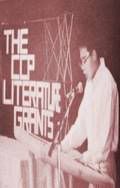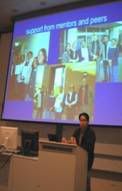‘Trapo’-like spins on UP tuition hikes by Solita Collas-Monsod
IT IS neither accurate nor fair to associate all students of the University of the Philippines (UP) with the so-called boycott of classes that was supposed to have taken place this past Thursday in protest of proposed tuition and other fee increases. What is accurate to say is that there was no boycott, or the boycott attempt failed. Why can one say this? According to information from all the colleges on campus, the classes proceeded as usual -- none were cancelled for lack of attendance. And this was buttressed by my own personal experience -- I teach two lecture classes on Thursdays, held in an auditorium because of the large class-size, and both were well attended. Definitely, there was no diminution of attendance that would spell “boycott.”
What is accurate to say is that what occurred was a rally/demonstration, attended by anywhere from 200 to 400 people (whether they were all from the UP community, one could not be certain; neither was it certain whether the students at the rally were all UP students), per eyeball estimate. One cannot really tell from the pictures because they were all “tight” shots -- almost close-up, giving the viewer no idea of the magnitude of the crowd. Which is in itself a dead giveaway, because if the crowd was large, the pictures taken would have been panoramic.
Moreover, as anyone familiar with the Diliman campus knows, these rallies/demonstrations are commonplace, and are generally organized by the same groups. Nevertheless, in the spirit of academic freedom and freedom of speech, they are allowed, defended, and even encouraged by the UP authorities. In effect, a rally of that size is no big deal.
A logical question would be: Why were there relatively few participants (considering that there are more than 25,000 students on campus, not to mention about the 1,500 faculty and 2,200 other staff)? One reason for this could be that, in the main, the students were indifferent -- probably because they will not be affected by any tuition fee increase, since this will only be imposed on incoming freshmen. The principle underlying this is that there is an implicit contract with students who had entered under a particular tuition fee structure that the structure would remain unchanged until they finished their studies. Doing otherwise would be like perpetrating a hold-up on their families, who would have very little choice other than to pay, because it is difficult to change schools.
But another reason -- which is not considered by many because of the perception that everyone in UP is a leftist/radical -- is that the students, studied, with no preconceived notions, the De Dios Committee recommendations (the report was released over four months ago) and found them reasonable. They refused to be carried away by the slogans and buzzwords that they were being inundated with.
A stretch? I don’t think so. In my years on the faculty, I have found that UP students, for the most part, have more important priorities than to wave banners, throw eggs, or scream epithets. But the latter is the kind of behavior that gets the publicity, and gives rise to the perception (including, that of Justice Secretary Raul Gonzalez, who should know better), that UP is a waste of public money.
Everyone has a right to his own opinion, of course. I do not quarrel with that. What I find disturbing, however, is a certain similarity between some campus leaders and their national counterparts: the tendency to take liberties with the truth. Putting their own spin, as it were the facts, until they are unrecognizable. The youth hate the “trapo” [traditional politicians] for doing it, but they seem to have no problems doing it themselves, if it helps their cause.
Take for example (if newspaper accounts are accurate) one UP student leader quoted as saying: “Can you imagine? From P6,000, you’ll suddenly have to shell out P18,000 a semester?” This young man must have known (unless he didn’t do his homework, in which case he is even more like his adult political counterparts), that only (incoming) freshmen whose annual family income is more than P500,000 a year -- i.e., those belonging to the top 5 percent of families in terms of income -- will have to pay that amount. Since it would be silly to waste his sympathy on them, or on those who will have to pay P30,000 a semester because their family annual income is over P1 million, he makes it appear as if all students have to pay that much.
Not content with that, he then expresses his concern that more and more indigent students would not be able to get into UP for the simple reason that they could not afford it. Excuse me? Again, he completely ignores (or just as bad, is ignorant of) the Student Tuition and Financial Assistance Program of UP. Under this, the poorest students are not only exempted from paying the tuition and other fees, they are also given stipends of P12,000 every semester. As I mentioned in last week’s column, even the not-so poor (with incomes of P70,001 to P135,000 a year) will not experience a tuition fee increase at all, because they will be given a 70 percent discount from the new fees. In other words, UP is definitely taking care of its poor but (intellectually) deserving students -- it has been doing so since 1989.
Intellectual dishonesty or incompetence has contributed to the nightmare that is Philippine governance. That it has started in one so young, an “iskolar ng bayan” [people’s scholar], and a possible future leader of the country, is a shame.
****
UP professors earn less than PMA cadets, says regent by DJ Yap(Published on Page A20 of the December 29, 2006 issue of the Philippine Daily Inquirer)
CADETS at the Philippine Military Academy (PMA) may not know it, but they are actually earning more than some teachers at what is considered the country’s premier educational institution, the University of the Philippines system.
While a PMA cadet gets P16,338 every month, including subsistence allowance, an assistant professor I at the state-run university, with salary grade 18, has a monthly salary of P15,841.
“At standardized salary rates, the UP faculty is resigned to a life of genteel poverty,” Roland Simbulan, faculty regent, said at the recent UP System-wide Academic Personnel Conference in the Diliman, Quezon City campus. “If a faculty member is an instructor or assistant professor, it means that he/she gets less than what a student earns in a call center,” he added.
The UP has a faculty of 3,600 educators in all its campuses.
Simbulan said that while faculty members were proud to be teaching some of the brightest students in the country, even the prestige of teaching at the premier university was being eroded by the more pressing need to survive.
“Because of their meager salaries, most UP teachers can only afford to live in rented apartments on or outside their campuses,” Simbulan said. And those who stayed on campus “dreaded” the day of their retirement, knowing they would be evicted from their subsidized housing facilities, he added.
“Professors who are too old to shift careers are forced to peddle insurance plans and real estate, chorizo, and even cemetery plots to augment their income,” Simbulan said in his report.
The meager compensation based on the Salary Standardization Law was a “pittance compared to what is given to professors in leading private universities,” he said.
According to the 2006 report of the UP Ad Hoc committee to review tuition and other fees, a full professor at UP is paid P13,686 per teaching load unit—well below the P27,971 at De La Salle University and P18,600 at Ateneo de Manila University.
A UP associate professor receives P11,019, while his/her counterparts at La Salle and Ateneo receive P18,312 and P15,400, respectively. For UP assistant professors, the basic rate is P9,033. At La Salle and Ateneo the rates are P13,645 and P11,000, respectively. UP instructors get P7,098, while those in La Salle and Ateneo receive P9,454 and P7,600, respectively.
Labels: education, solita collas-monsod, university of the philippines, winnie monsod

































































































































































































0 Comments:
Post a Comment
<< Home